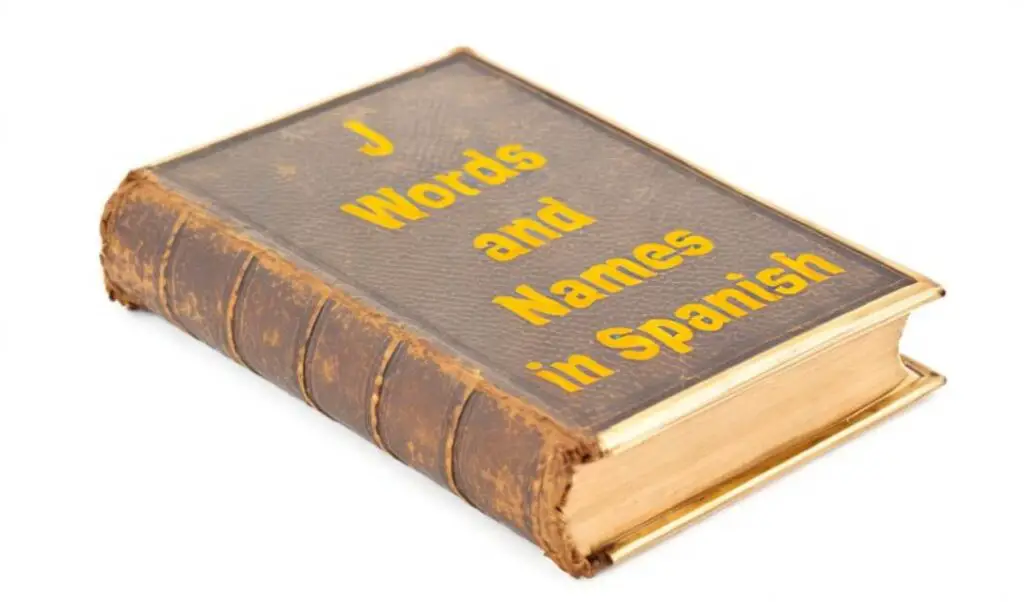Spanish is a fascinating language that is spoken by millions of people around the world. It is known for its rich culture, beautiful architecture, and delicious food. One of the unique features of the Spanish language is the letter J, which plays an important role in its spelling, pronunciation, and grammar. In this article, we will explore the importance of the letter J in Spanish and why it matters.
The letter J in Spanish, or “la letra J” as it is known in Spanish, is a consonant that has a distinctive sound. It is pronounced differently than in English and can be challenging for non-native speakers to master. However, understanding how to use the letter J correctly is essential for effective communication in Spanish.
J is an essential part of the Spanish alphabet and is used in many common Spanish words. Some of these words include “jirafa” (giraffe), “joven” (young), and “juego” (game). Knowing these J words in Spanish is crucial for anyone who wants to speak and understand the language.
J also plays a significant role in Spanish names. Many Spanish names, such as “Javier” and “Jose,” begin with the letter J. Learning J names in Spanish is important for anyone who wants to communicate with Spanish speakers and understand their culture.
Another crucial aspect of the letter J in Spanish is its sound. The J sound in Spanish is unique and different from the J sound in English. It is important to understand how to pronounce the J sound correctly in Spanish to avoid misunderstandings and to communicate effectively.
Finally, the proper J Spanish pronunciation is essential for speaking Spanish correctly. Knowing how to pronounce J correctly in Spanish can make a big difference in how well you communicate with native Spanish speakers.
Ultimately, the letter J in Spanish is a critical part of the language and plays an important role in its spelling, pronunciation, and grammar. Understanding the J sound in Spanish, J words in Spanish, J names in Spanish, and J Spanish pronunciation is essential for effective communication in Spanish. In the following sections, we will explore the origin and history of the letter J in Spanish, its significance in Spanish spelling and pronunciation, and its cultural importance.
The Origin and History of the Letter J in Spanish

The letter J has an interesting history in the Spanish language, with roots dating back to its use in Latin. In Latin, the letter J was used to represent the “i” sound in words such as “Iulius” (Julius) and “Iesus” (Jesus). However, it was not until the 15th century that the letter J began to take on a more prominent role in the Spanish language.
During this time, the letter J began to replace the use of the letter I in certain contexts, particularly at the beginning of words. This was done to distinguish the “i” sound from the “j” sound, which had become more distinct in the Spanish language over time. The use of the letter J in this way became more widespread in the 16th century, and by the 18th century, it had become a standard part of the Spanish alphabet.
Old Spanish, the version of Spanish spoken from the 9th to the 15th century, used the letter X in many words where the letter J is used today. This was because the sound represented by the letter J was not yet distinct in Old Spanish. As the language evolved and the J sound became more pronounced, the use of the letter J began to replace the letter X in many words.
In modern Spanish, the letter J is used in a variety of contexts, including at the beginning of words, within words, and at the end of words. Its use is governed by a set of rules that dictate when it should be pronounced as a “h” sound (such as in “jefe” meaning boss) and when it should be pronounced as a “y” sound (such as in “jardín” meaning garden).
Overall, the evolution of the letter J in the Spanish language is a fascinating example of how languages change and adapt over time. Its origins in Latin and its subsequent development in Old and Modern Spanish are a testament to the rich history of the Spanish language and the important role that the letter J plays in it.
The Importance of the Letter J in Spanish Spelling and Pronunciation

The letter J plays a significant role in the Spanish language, affecting both spelling and pronunciation. Understanding its importance can greatly improve one’s ability to communicate effectively in Spanish.
The letter J has a distinct sound in Spanish, which is often described as a guttural sound that is not present in English. This sound is produced by a vibration in the back of the throat, similar to the “ch” sound in German or the “kh” sound in Russian. It is important to master this sound in order to correctly pronounce words that contain the letter J.
There are many common Spanish words that contain the letter J, such as “jardín” (garden), “juego” (game), and “justo” (just). Pronouncing these words correctly can be challenging for English speakers, as the J sound is not present in English. It is important to practice and familiarize oneself with the proper pronunciation in order to communicate effectively.
In Spanish spelling, the letter J is used to represent the same sound as the letter H in English. For example, the word “hablar” (to speak) is spelled with an H in English, but a J in Spanish. Similarly, the word “jefe” (boss) is spelled with a J in Spanish, but an F in English.
It is important to note that there are specific rules for using the letter J in Spanish spelling and pronunciation. For example, the letter J is never used at the beginning of a word in Spanish, except in loanwords from other languages. Additionally, the letter J is always pronounced as a strong guttural sound, even when it appears in combination with other letters.
To summarize, the letter J is an important component of Spanish spelling and pronunciation. Understanding its role and mastering its sound can greatly improve one’s ability to communicate effectively in Spanish. Practice and familiarization with common J Spanish words, J sound in Spanish and J Spanish pronunciation is key to achieving fluency in the language.
J Words and Names in Spanish

The Spanish language is a rich and vibrant language that is known for its unique pronunciation and spelling rules. The letter J is one of the most important letters in Spanish, and it plays a crucial role in both pronunciation and spelling. In this article, we will explore the importance of the letter J in Spanish, specifically in J words and names.
J words in Spanish are numerous, and they are used in a variety of contexts. From everyday words like “jugar” meaning “to play” to words that are more specialized like “jirafa” meaning “giraffe,” the J sound adds depth and meaning to the language. Additionally, the letter J is present in many Spanish names, and these names have significant cultural and historical importance in Spanish-speaking countries.
This article will explore common J words and names in Spanish, their meanings and significance, as well as the rules for using the letter J in Spanish spelling and pronunciation. Whether you’re a beginner learning Spanish or an advanced speaker, understanding the role of the letter J in the Spanish language will deepen your appreciation for this beautiful language. So, let’s dive in and explore the importance of the letter J in Spanish!
Ten common J words in Spanish
While the Spanish language is full of beautiful and unique words, the letter J has a particular significance due to its importance in both spelling and pronunciation. The letter J appears in many common Spanish words, each with its own unique meaning and contribution to the language’s richness. In this section, we’ll explore ten of the most common J words in Spanish and their meanings.
First on the list is “jugar,” which means “to play.” This versatile verb is used in a variety of contexts, from playing sports to playing games with friends. Another frequently used J word is “joven,” which means “young.” This word is commonly used to describe a person who is in their youth or early adulthood.
The Spanish language is also home to some unique and interesting J words, such as “jardín,” which means “garden,” and “jirafa,” which means “giraffe.” Other common J words include “juez,” which means “judge,” and “jengibre,” which means “ginger.”
The letter J itself also has a word in Spanish, which is “jota.” This word is used to refer to the letter J in general and is often used when teaching Spanish pronunciation.
Moving on to more specific J words, “jornada” means “workday” and is often used in the context of employment or daily work. “Júbilo,” on the other hand, means “jubilation” and is used to describe feelings of happiness and joy. Lastly, “juntar” means “to join” or “to collect,” and it’s often used in the context of gathering or bringing things together.
While these are just ten examples of the many J words in Spanish, they showcase the variety and depth of the language. So whether you’re a Spanish language learner or simply appreciating its beauty, exploring the many J words in Spanish is a great way to deepen your understanding of the language and its culture.
Ten common Spanish names that contain the letter J
The Spanish language is known for its rich culture and history, and this is reflected in the many beautiful and unique names that contain the letter J. These names have been passed down through generations and are an essential part of the Spanish-speaking community. Here are ten common Spanish names that contain the letter J and their significance.
- Juan is a popular Spanish name for boys that means “God is gracious.” It is a timeless name that has been used for centuries and is still widely used today. It has a strong religious connotation and is often associated with kindness and compassion.
- Julia is a classic Spanish name for girls that means “youthful.” It is a simple yet elegant name that has a timeless quality. It is often associated with beauty, grace, and wisdom.
- Javier is a popular Spanish name for boys that means “new house” or “bright.” It is a name that is often given to boys who are expected to bring light and joy into the world. It is a name that is both strong and optimistic.
- Jimena is a unique Spanish name for girls that means “listener.” It is a name that is often given to girls who are thought to be good listeners and communicators. It is a name that is both feminine and strong.
- Joaquín is a traditional Spanish name for boys that means “God will judge.” It is a name that is often given to boys who are expected to be wise and just. It is a name that is both classic and powerful.
- Jacinta is a rare Spanish name for girls that means “hyacinth flower.” It is a name that is often associated with beauty and grace. It is a name that is both unique and elegant.
- José is a timeless Spanish name for boys that means “God will increase.” It is a name that is often associated with strength and power. It is a name that has been used for centuries and is still widely used today.
- Jazmín is a lovely Spanish name for girls that means “jasmine flower.” It is a name that is often associated with beauty, grace, and elegance. It is a name that is both feminine and delicate.
- Jorge is a popular Spanish name for boys that means “farmer.” It is a name that is often associated with hard work and perseverance. It is a name that is both classic and strong.
- Juliana is a beautiful Spanish name for girls that means “youthful” or “dedicated to Jupiter.” It is a name that is often associated with intelligence and beauty. It is a name that is both elegant and powerful.
Finally, the letter J plays an essential role in the Spanish language, not only in words but also in names. The names listed above are just a few examples of the many beautiful and unique names that contain the letter J. They reflect the diversity and richness of the Spanish-speaking community and are a testament to the culture and history of this beautiful language.
J sound in Spanish

The letter J in Spanish has a unique sound that distinguishes it from English. In Spanish, the J is pronounced as an aspirated sound that is similar to the English “h.” This means that words like “jugar” and “joven” are pronounced as “hoo-gar” and “ho-ven” respectively. The sound of the J in Spanish can be tricky for English speakers to master, but it is an essential aspect of the language.
The J sound in Spanish also has significant cultural and historical importance. In music, the J sound can be heard in various traditional Spanish genres, such as flamenco and mariachi music. The rhythmic and percussive use of the J sound in these styles adds to their distinctive character and helps create a unique sense of Spanish identity.
In literature, the J sound is often used for poetic effect. Spanish poets use the J sound to create alliteration and assonance, which add to the musicality of their work. For example, in Federico Garcia Lorca’s poem “La Casada Infiel,” the J sound is used repeatedly to create a sense of longing and desire:
“La noche no quiere venir para que tú no vengas, ni yo pueda ir.”
The J sound in Spanish is also significant because of its association with certain words and names. The name “Joaquín,” for example, is a traditional Spanish name that contains the J sound and means “God will judge.” Similarly, the word “júbilo,” which means “jubilation,” is often used in Spanish to describe celebrations and happy occasions.
Overall, the J sound in Spanish is not only a unique and essential aspect of the language but also a significant cultural and historical marker. From music and literature to names and words, the J sound is an important part of Spanish culture and identity.
Conclusion
The letter J plays a significant role in the Spanish language. From J words and names to the J sound and its cultural significance, the letter J is an essential part of the language’s identity. Spanish speakers around the world use J words daily, including jugar, joven, jardín, and juez, among others. Additionally, many popular Spanish names, including Juan, Julia, and Javier, contain the letter J.
The J sound in Spanish is unique and differs from English, making it an exciting feature for language learners. The sound is formed by pressing the tongue against the roof of the mouth and forcing air out, creating a distinctive and crisp sound. The J sound has cultural significance in the Spanish-speaking world, as it is used extensively in music and literature.
Learning Spanish and its unique features, including J Spanish words, J names in Spanish, J sound in Spanish, and J Spanish pronunciation, can provide a deeper understanding and appreciation for the language and its culture. So why not start learning today?
To sum up, the Spanish language’s J sound and J words have significant cultural and linguistic significance. Whether you’re a native Spanish speaker or learning the language, the letter J is an important aspect of the language’s identity that deserves recognition and appreciation.It is worth noting, while the letter J holds great cultural significance in Spanish language, from common J words to J names in Spanish, it also carries a deeper spiritual meaning of the letter J, representing a connection to the divine and the journey towards enlightenment.




